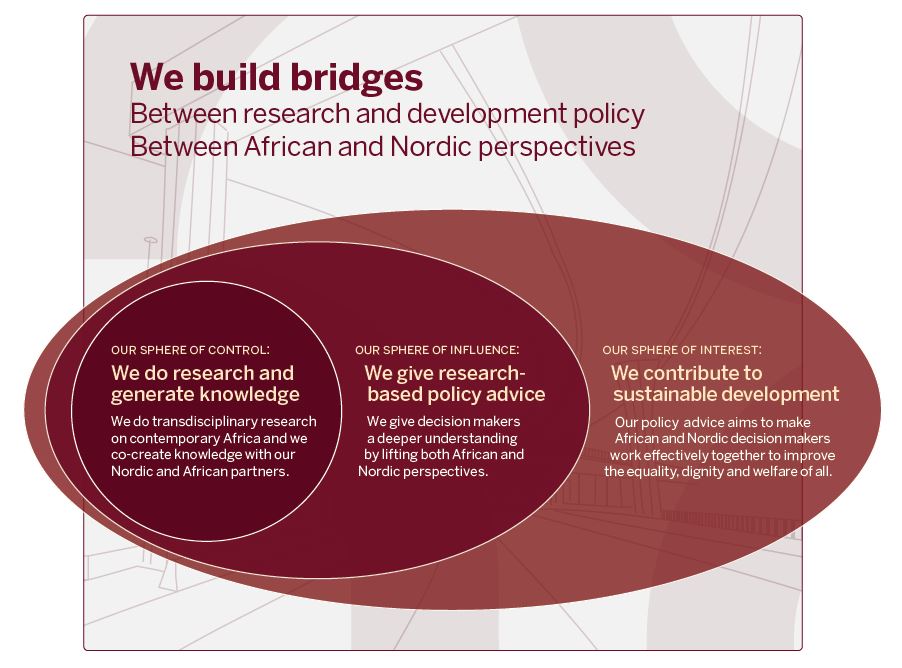Strategy 2022-2026
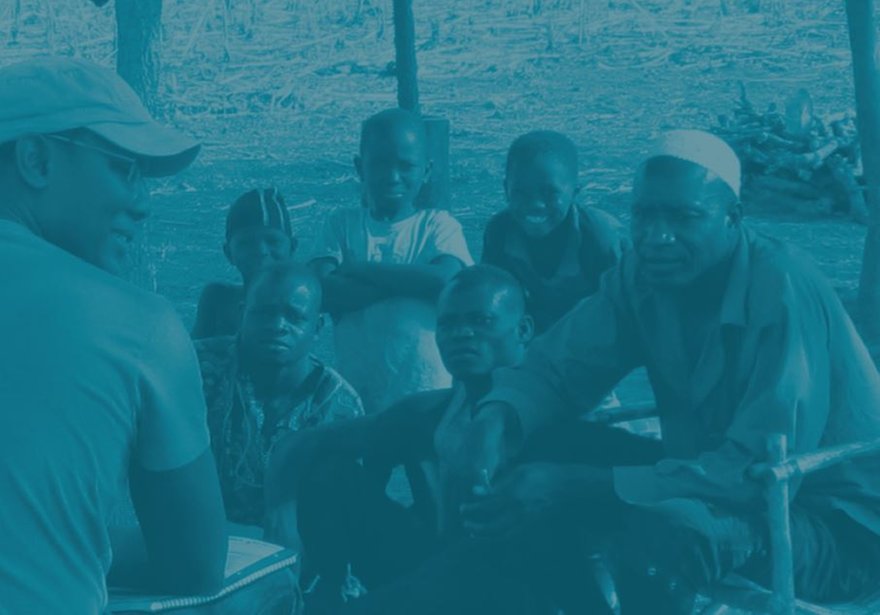
Northern Benin. Papa Sow, senior researcher at NAI, interviews a group of informants.
This strategy will help steer our work over the coming five years, clarifying how we intend to co-create and communicate knowledge that will ultimately contribute to a deeper understanding of Africa. It will act as a guiding framework, sitting alongside our annual planning cycle in order to provide the Institute with the built-in flexibility it needs to adapt and stay relevant.
We are uniquely positioned to play a strategic role in analysing the challenges and opportunities facing Africa
Director's statement
Contemporary Africa faces a fast-changing set of opportunities and challenges. Greater integration, rising geo-political importance, a youthful demographic, digital innovation and women’s roles in peace building all offer the potential for positive transformation. Conversely, many of today’s global challenges – such as the Covid-19 pandemic, climate change and food insecurity – are impacting African countries particularly hard, and in the process becoming bound up with local dynamics. Identifying appropriate courses of action to support societal transformation demands a nuanced understanding of peoples’ lived experiences, including whether change can unfold in ways that support fundamental human rights, equality, dignity and wellbeing.
For many years, Nordic governments have been at the forefront of responding to these challenges and opportunities. Nordic institutions have evolved their international development approaches and demonstrated support for multilateral engagement. This has included a strong emphasis on the role of science as a cornerstone of democracy, providing a platform from which to address contemporary challenges in an era of increased miscommunication and disinformation.
The Nordic Africa Institute, established in 1962, is a knowledge hub for collaborative research, documentation and communication. Guided by our institutional theory of change, our aim is to be a knowledge-generating, policy informing, collaborative organisation that supports a deeper understanding of contemporary African perspectives, challenges and opportunities.
As a Swedish research-led public agency and as a beneficiary of several Nordic governments, we are uniquely positioned to play a strategic role in analysing the challenges and opportunities facing Africa. We work to co-create knowledge with partners in African and Nordic settings; act as a trusted institutional bridge spanning African and Nordic perspectives; and contribute a wealth of high quality insights on contemporary Africa. Underpinning this strategic role is an emphasis on people and values, which lies at the very heart of what we do.
Working in effective and integrated ways, our aim is always to improve the lives of those affected by poverty and inequality. As an institute, we strive to be anchored in the reality of Africa today, while seeking to understand the Africa of tomorrow.
This strategy will help steer the Institute’s work over the coming five years, clarifying how we intend to co-create and communicate knowledge that will ultimately contribute to a deeper understanding of Africa. Throughout, it will act as a guiding framework, sitting alongside our annual planning cycle in order to provide the Institute with the built-in flexibility it needs to adapt and stay relevant.
Uppsala, November 2021
.jpg)
Target groups
‘Nordic decision-makers’ are identified by the Swedish government as the main target group for the Nordic Africa Institute (NAI). The Institute interprets this as being representatives from government offices and public agencies of the Nordic countries mandated to help improve the equality, dignity and welfare of people across contexts in Africa.
To develop deeper understanding of contemporary Africa among Nordic decision-makers, further target groups are integral to the co-creation of knowledge.

This includes people on the African continent who may or may not be in positions of power or influence, who can provide a vital understanding of issues based on their lived experiences. Hence, NAI’s target groups encompass (but are not limited to):
- people with whom research is conducted, scholars and academic communities in the Nordics and in African countries
- the media
- Nordic and African policy advisors, senior officials, members of parliament and private sector actors
- civil society change-makers/thought leaders in Africa and the Nordics, including diaspora communities based outside the African continent.
Maintaining at all times a sensitivity to policy trends and an emphasis on African centred policy dialogue, NAI works with its partners from these target groups to help inform the Nordic policy agenda.
Vision, mission and theory of change
Vision
African and Nordic decision-makers work effectively together to improve the equality, dignity and welfare of people across contexts in Africa.
Mission
Provide deeper understanding amongst Nordic decision-makers and associated change-makers of contemporary African perspectives and societal dynamics.
The Nordic Africa Institute's (NAI’s) mission statement captures its intended contribution to effective and informed decision-making, centred on deepening understanding of African perspectives and societal dynamics among Nordic decision-makers and associated change-makers.
Building on sixty years of experience, NAI is constantly attempting to extend its reach to wider target groups, including those on the African continent. As a values-based organisation and independent analyst specialising in the social science of contemporary Africa, NAI aligns its work with the core principles of the United Nations’ 2030 Agenda (people, planet, prosperity, peace, and partnerships) and the aspirations of the African Union’s Agenda 2063 (prosperous, integrated, good governance, peaceful, cultural identity, people centred and global player).
Acknowledging the importance of making development a reality for all, NAI places emphasis on upholding equality, building empowerment, respecting human rights, and drawing attention to the fundamental importance of peace and security. Acting as a knowledge hub on contemporary Africa positions NAI as a catalyst to advance understanding, which in turn can inform action.
The Institute places emphasis on understanding how societal dynamics and change affect people’s lives, and how people’s lived experiences motivate them to act in different ways. By underlining the value of dialogue and knowledge co-creation, as well as disseminating publications from the African continent through its library, NAI seeks to expose Nordic decision-makers to diverse perspectives from the continent, in doing so reinforcing Nordic–African relationships.
Theory of change
The Institute’s theory of change (pdf) Pdf, 1.1 MB, opens in new window. captures how NAI seeks to enable African and Nordic decision-makers in working effectively together for the equality, dignity and welfare of people across contexts in Africa. Embedded within it is an understanding that achieving change from knowledge is not a linear or simple process. Asymmetric power relations shape the framing of knowledge, policy dialogue and action. Moreover, change happens in unintended ways.
Pdf, 1.1 MB, opens in new window. captures how NAI seeks to enable African and Nordic decision-makers in working effectively together for the equality, dignity and welfare of people across contexts in Africa. Embedded within it is an understanding that achieving change from knowledge is not a linear or simple process. Asymmetric power relations shape the framing of knowledge, policy dialogue and action. Moreover, change happens in unintended ways.
NAI embraces the assumption that credible, legitimate and relevant knowledge can help inform the decision-making that affects people’s lives. As such, science communication is central to NAI’s mission of creating a deeper understanding among target groups of the societal transformations and challenges present in Africa. Rather than dissemination being a one-way flow, NAI regards co-creation and dialogue as key tools in knowledge building. NAI’s library services provide an excellent repository on contemporary Africa, while its communications unit is constantly developing and tailoring formats that facilitate learning and understanding. NAI strives to communicate in ways that are practical, useful and attractive to its main target groups.
The Institute
As a Swedish public agency under the Ministry of Foreign Affairs, and a beneficiary of several Nordic governments, NAI is uniquely positioned to present African perspectives and facilitate policy dialogue with Nordic decision-makers. The Nordics continue to play an important role in relation to both Africa’s development and the African Union’s aspiration that Africa be an influential partner in global affairs. Through providing a unique platform for knowledge-sharing between Africa and the Nordics, the Institute is able to leverage this role to maximum effect.
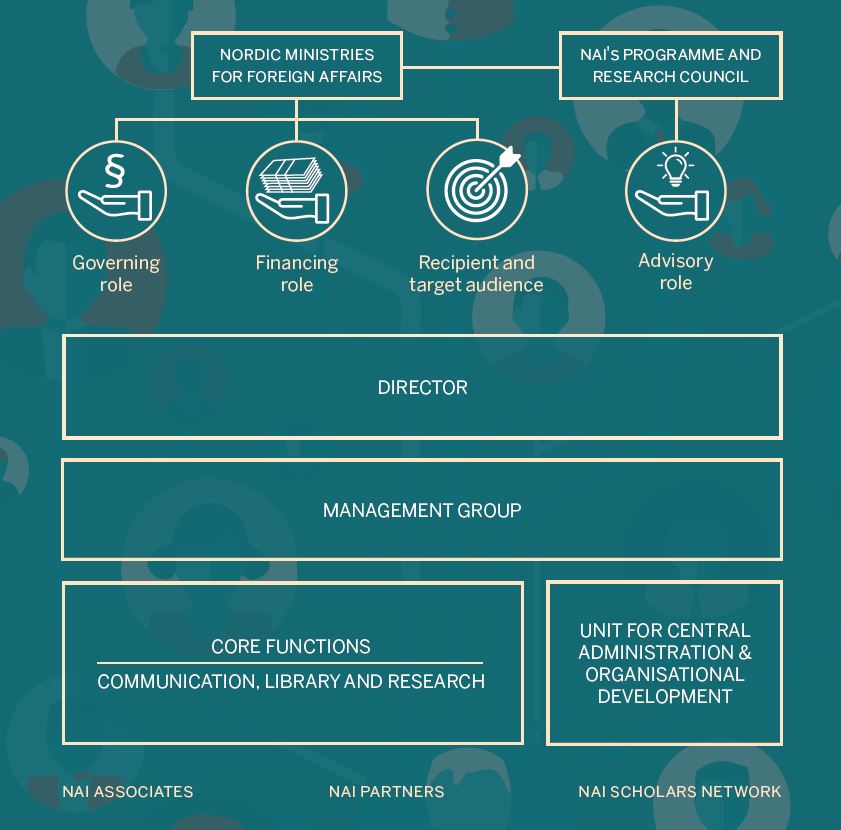
Organisational structure
NAI has a clear organisational structure and strong equitable values. A director appointed by the Swedish government heads the Institute. NAI has an advisory body named the Programme and Research Council. Each of the Nordic countries that contribute funding to NAI has two council members, with at least one of them representing their country´s research environment.
The Institute is organised around three core functions – research; communication; and library services – and divided into four units: Central Administration and Organisational Development; Library; Research; and Communications.
The core functions enable NAI to fulfil the tasks set out in its Ordinance (2021: 371) from the Swedish government. The heads of the four units, together with the Director, form the Management Group. As a Swedish public agency, NAI is guided by the laws and regulations of the Swedish government, as instituted within NAI’s Rules of Procedure and Formal Annual Work Plan.
Anchored in shared values
The Institute adheres to key values associated with the Swedish civil service: democracy, legality, objectivity, freedom of opinion, respect, efficiency and service. As elaborated in the Human Resource policy, leadership at NAI is trust based, and the Institute upholds a culture of equality, diversity and inclusion. Embedded within this are the three C’s: Culture, Competence and Capacity. Here, too, NAI recognises the shared values of involvement, communication, trust and transparency.
- Culture
Staff have a collective responsibility to contribute towards
a caring and collegial workplace that enables individuals to fulfil their
duties to the highest standard. - Competence
Staff have equal opportunities to perform their work
duties, get satisfaction from their work, flourish within their field of
expertise, and experience personal development. - Capacity
Staff have clear roles and responsibilities in their respective
units, while ‘working as one’ in an integrated fashion, taking into account
the entire organisation while respecting diversity and difference.
Fulfilling NAI’s mission
NAI respects diversity while ‘working as one’ towards common goals, effective resource allocation and efficient cross-unit working. This enables the Institute to proactively inform Nordic policy, respond to African trends and perspectives, and generate positive impacts that improve the lives of those affected by poverty and inequality.
Acknowledging the value of NAI’s Nordic identity and position, the Institute will work throughout the strategy period to strengthen its integrated approach to knowledge generation, library dissemination and timely communication, responding flexibly to emerging policy challenges. In advancing the Institute’s bridging role, NAI will continue to foster vibrant programmes for visiting scholars, work with selected institutional partners, and engage with scholarly and policy networks.
To enable the Institute to fulfil its mission and contribute to its vision, staff will pursue three interlinked outcomes throughout the strategy period: a knowledge-generating profile; a policyinforming role; and an established position within the Nordic region as a collaborative knowledge hub. The aim across all three will be to reflect the core principles of the United Nation’s Agenda 2030 and the aspirations of the African Union’s Agenda 2063.
A knowledge-generating organisation
NAI co-creates and shares credible, legitimate and relevant knowledge through trans-disciplinary research and effective science policy communication.
At its core, NAI is a research-led organisation and knowledge hub focused on the social science of contemporary Africa. Staff co-create and share knowledge with African and Nordic partners and associated change-makers in order to deepen understanding and inform policy thinking. NAI seeks to build relationships based on trust and equality.
The Institute’s research credibility is a central element of its mission to influence policy thinking and decision-making. NAI’s robust research on contemporary Africa gives the Institute legitimacy and relevance with decision-makers and change-makers. Ongoing collaboration with external partners, associates and visiting scholars introduces fresh perspectives and raises new policy-relevant issues.
NAI recognises that a trans-disciplinary approach is critical to addressing complex social issues. As such, staff work across social science disciplines and with non-academic partners to improve the quality and utility of the Institute’s research. Key to this approach is how staff elicit international, regional and local perspectives, building policy insights from the ground up.
Effective science policy communication is at the heart of NAI’s capacity for credibility and relevance. With this in mind, the Institute initiates and facilitates engagement around a variety of issues, makes knowledge accessible to all target audiences, and creates platforms conducive to knowledge exchange and inclusive dialogue.
The Institute uses its library and position within the research infrastructure as a vehicle to support scholarship, as well as to disseminate information about knowledge products generated on the African continent. NAI’s library and office space acts as a conducive environment for knowledge-sharing and academic exchange, enriched by the Institute’s scholarship and associates programmes. This environment helps NAI in supporting others to generate relevant knowledge, and in contributing information on resources.
A policy-informing organisation
NAI provides credible, legitimate and relevant knowledge to Nordic decision-makers and associated change-makers. This knowledge is sensitive to policy trends and facilitates research-based African-centred policy dialogue, helping to inform the Nordic policy agenda.
At NAI, staff address societal issues through policy-relevant research and dialogue. Despite policy processes often being non-linear, this means a clear pathway can be traced from in-depth and often long-term research endeavours to improved understanding. In turn, such understanding helps generate informed decision-making among those working on African policy responses.
Science policy communication is central to the Institute’s ability to inform policy. Through communication, the Institute seeks to contribute to policy discussions by providing insights into the underlying social, political, economic and environmental dimensions that shape policy issues. In doing so, NAI’s ultimate aim is to stimulate deeper reflection among Nordic decision-makers on long-term societal dynamics.
The library, with its first-class repository of written knowledge on contemporary Africa, plays a related role. Not only does it provide support for current Nordic and African decision-makers, it makes available a multitude of resources sought by the next generation of change-makers as they undertake graduate, post graduate and post-doctoral research.
A collaborative organisation
NAI thrives as a knowledge hub, bridging African and Nordic perspectives on contemporary Africa, and adding value through strong partnerships and collaboration.
Collaboration is vital both to the co-creation of knowledge and to dialogue about contemporary Africa, including with African decision-makers. NAI’s working environment is supportive of this collaboration, and of learning through interaction, thereby advancing scholarly debate and expertise to the mutual interest of all involved.
As a knowledge hub, the Institute positions itself as an interface between African and Nordic institutions, conveying African perspectives on contemporary issues to Nordic decision-makers and vice versa. Acting as a bridge between Africa and the Nordic region, NAI endeavours to ensure knowledge generation on Africa is collaborative and involves genuine partnerships, facilitated by NAI’s scholarship programmes, institutional partnerships and associates.
Complementing this bridging role, the Institute recognises the importance of representing new or lesser-heard voices and debates, and of prioritising African perspectives that can both challenge and inspire Nordic thinking. While digital innovation can greatly facilitate this process, face-to-face dialogue continues to be valued.
Operational objectives
In order to reach its three interlinked outcomes of being a knowledge-generating, policy-informing, and collaborative organisation, NAI has set three operational objectives for its work.
NAI shall:
- Strengthen its capacity for knowledge co-creation between Nordic and African partners.
- Strengthen its bridging role between African perspectives and Nordic policy audiences.
- Strengthen its cross-unit collaboration and learning, including through digitalisation.
The details of the Institute’s work towards these operational objectives will be described in the annual planning cycles.
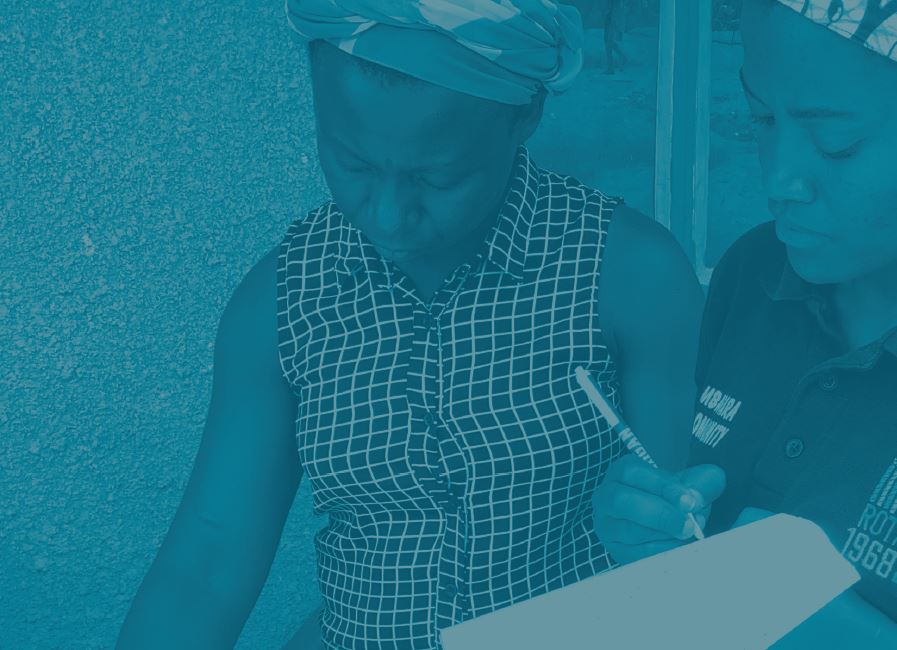
Clara Atuhaire and Christine Karungi, research assistants forthe Gold Matters research project, conducting a focus groupdiscussion in Buhweju District, Uganda. Photo: Eleanor Fisher.
Impact areas
NAI recognises its considerable strength when it comes to generating in-depth, contextually informed and empirically driven scholarship on contemporary Africa. Covering a range of social science disciplines, this scholarship is situated at the crossroads of African and Development Studies.
More than ever, societal transformation necessitates that social science assumes a central role in informing policy advice. Science and technology deliver fundamental advances, achieving relevance and longevity in contexts where governance and society are in a position to embrace positive change. This implies a need for nuanced understandings of a diverse continent.
During the 2022–2026 strategy period, staff at the Institute will work on focused but flexible areas of policy-relevant research. Throughout, the emphasis will be on institutional partnerships, knowledge co-creation and trans-disciplinarity. To facilitate these processes, NAI will endeavour to provide effective and equitable forms of partnership, in recognition of the unequal global structures of knowledge production confronted by scholars across the African continent.
In order to realise effective policy relevance, the Institute’s research, communication and library functions will work together to generate policy impact in five areas. Each impact area contributes to understanding relevant to the core principles of the United Nation’s Agenda 2030 and the aspirations of the African Union’s Agenda 2063. These are:
- Equality, Social Justice & Inclusion
- Governance, Citizenship & Participation
- Economy, Employment & Mobility
- Climate, Natural Resources & Sustainability
- Peace, Security & Human Rights
Institutional planning cycles will help identify thematic priorities within each impact area, while flexibility regarding these priorities will enable staff and visiting scholars to work collaboratively on topics relevant to policy demands. In doing so, NAI’s research and communication processes will strive to embed crosscutting issues, including on gender, mobility, demography, regional-ethnic particularities, power dynamics and agency.
1. Equality, Social Justice & Inclusion
As 2030 edges closer, challenges associated with inequality remain profound, underlining the importance of deeper understanding and dialogue in identifying opportunities for positive societal transformation. The core Sustainable Development Goal (SDG) principle of ‘leave no one behind’ reinforces a continued need to focus on themes relevant to equality and inclusion, equity and social justice.
Inequalities and inequities are underpinned by differences in, among other things, power, status, income, wealth and geography. Such differences are rooted in colonial histories and perpetuated by contemporary dynamics. These dynamics are spatially situated, intergenerational and entwined with poverty, contributing to discrimination, disempowerment, spatial segregation, and structural inequities when it comes to accessing services and infrastructure. This manifests in how ‘others’ are treated, whether as migrants, refugees or internally displaced persons, or due to features or identities associated with gender, religion, political exclusion, ethnicity or sexuality.
Thematic priorities will evolve throughout the strategy period, including in relation to impacts arising from Covid-19. Priorities will build on the current attention being paid by NAI to postcolonial and decolonial debate, African feminisms, research on academic freedom, and research on just and equitable sustainability transformations.

2. Governance, Citizenship & Participation
Attention must be paid to inclusive, active citizenship at both the local and national levels; public access to accurate information; the rule of law; and executive accountability in development policy formulation and implementation. Challenges are wide-ranging and include an absence of free and fair elections, government repression of civil society, gender inequality, a weak judiciary, and media and educational crises. Such challenges underline the importance of good governance, political legitimacy and citizen participation. Social segments of particular note in this interplay are the growing urban middle classes and younger generations. Moreover, in focusing attention on those who are most vulnerable or have many dependents, social policies bring state–citizen relations to the fore, notably in terms of approaches to social protection.
Feeding into this are the rights and obligations associated with citizenship or belonging to a state, which involve conferring security, consolidating freedom of association and expression, and facilitating access to justice and services. At a time when globalisation, population mobility and digitalisation are shifting political identities and participation – including for African diaspora living outside the continent – the role of citizenship continues to gain increasing relevance. This area goes hand in hand with Impact Area 1.
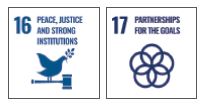
3. Economy, Employment & Mobility
The twin challenges of poverty and volatile economic growth demand attention. Strong economies drive employment opportunities, build human capital, create development, stimulate wellbeing and generate prosperity. Africa’s youth is set to double by 2050, and countries face a stern test in harnessing this demographic dividend. Education remains a cornerstone for enhancing productivity.
In terms of job creation, the challenge remains as to how business potential can most effectively be unlocked to provide well-paid jobs and decent work. The state, institutions and governance are all crucial in facilitating opportunities. Enhancing equity involves redistribution – inevitably, this poses challenges for states, not only when it comes to mobilising resources but in generating the legitimacy needed to build trust in fiscal systems. Continental agreements can support job creation, while digital technologies can transform economic structures and generate better-paid jobs. Intra-African migration, meanwhile, can play a key role in human capital development, as acknowledged by the African Union agenda for the free movement of people.
This impact area includes a focus on urbanisation and mobility, encompassing both internal and international migration. Urban development contributes to dynamic economies and diversification. Moreover, rural–urban dynamics and shifts within the informalisation/formalisation of labour are critically important for change. Attention will continue to be paid to the economic impact of the Covid-19 pandemic. Impact Areas 1, 2, 4 and 5 all have resonance with Impact Area 3, with inclusive development, security, the rule of law and sustainable use of natural resources all contributing to robust and prosperous economies.

4. Climate, Natural Resources & Sustainability
Climate change, natural resource conflicts and environmental degradation demand a focus on sustainability. Such a focus extends beyond environmental systems to encompass the interlinked social, economic and political dimensions of environmental and climate justice. Of central importance are questions of how resilience can be built, how the negative impacts of environmental change can be mitigated, and how best to capture opportunities for sustainability transformations.
Natural hazards, rising temperatures and erratic weather patterns add stress tolimited adaptive capacity. In rural Africa, where there is often a high dependency on rain-fed agriculture, as well as significant poverty and food insecurity, impacts disproportionately harm women and youth. Furthermore, the risks for African cities require innovative planning and governance strategies aimed at strengthening resilience and safety measures. In line with Agenda 2030, climate justice necessitates that NAI focuses on citizen rights, social justice and equity considerations, rather than the science of climate change. This both reiterates the centrality of Impact Areas 1 and 2, and demands that, as part of Impact Area 3, sufficient attention be given to the nature of extractive industries and resource management.

5. Peace, Security & Human Rights
To reduce or end violent conflict, and as part of producing African solutions to African problems, processes of building peace and security must strengthen fundamental human rights and political inclusion. There are many external interests and geo-political circumstances that fuel conflict and feed into complex local dynamics, including from flawed democratic institutions and processes, human rights abuses, competing claims over land and natural resources, and lack of access to education or health care. An international and African agenda to prevent conflict, genocide and mass atrocity and to promote peacebuilding and sustainable solutions exists but is weakened by many factors. These include limitations on women’s full and meaningful participation in peace processes, insufficient safety and security for girls, and the violent exploitation of boys.
Within states, contested political transitions can provoke violent clashes, as can the vulnerability of democratic institutions to corruption and elite competition, citizen exclusion, and the closure of space for civil society engagement. Extreme cases, if unaddressed, can escalate into mass atrocity or even genocide. Natural resource conflicts and competition for land, as well as communal conflicts around livelihoods or ethnic/religious identity, can also turn violent.
Violent conflicts instigated by non-state actors – either home grown or linked to international networks – are on the rise, as is the targeting of civilian populations. Persistent cycles of violence, even in peaceful states or between allied nations, require attention. Finally, the humanitarian consequences associated with internally displaced persons and refugees are also pertinent, highlighting the need for such populations, as well as migrants more generally, to be properly
integrated within society – an issue also relevant to Impact Areas 1, 3 and 4.
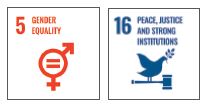
Organisational monitoring, evaluation and learning
Throughout this strategy period and beyond, NAI will be a learning organisation. The Institute’s annual planning and budgeting cycles will be fed by ‘feedback loops’ of information that will, in turn, stimulate organisational reflection, learning and adaptation. These feedback loops will provide monitoring information, tracking progress towards the achievement of NAI’s outcome- and impact-level objectives, thereby helping the Institute to better understand its contribution to its stated mission and its value as an organisation. A separate monitoring, evaluation and learning (MEL) framework will action this process.
NAI will focus on outcome- and impact-based learning and evaluation in order to understand how and to what degree it contributes to informing Nordic policies. This ‘higher level’ monitoring marks a shift away from relying on activity and output tracking in annual reporting, and will allow the Institute to better develop its policy relevance.
As part of this shift in emphasis, NAI recognises that the changes targeted by this strategy are not achievable through linear or predictable pathways, and cannot be measured by simple metrics. The changes the Institute wishes to contribute to are systemic. NAI will adopt a variety of methods, data and analytical tools in order to understand how change happens in both the short and long term, and to enable staff to reflect on how they can most effectively work on NAI’s operational objectives through successive planning cycles.
This learning process should not be internal and insular. Rather, this is an opportunity for NAI to utilise its communication and digital expertise to share learning with partners and visiting scholars, thereby encouraging a broader, more collaborative dialogue about the Institute’s effectiveness.

